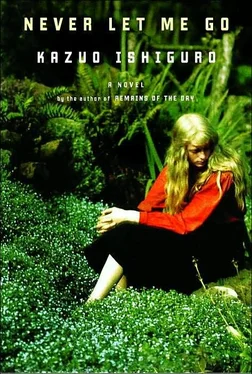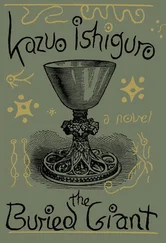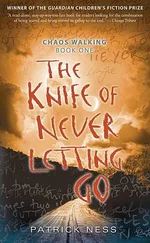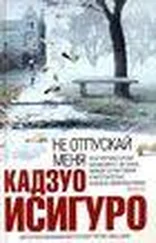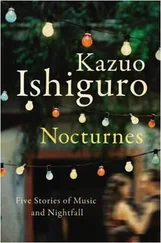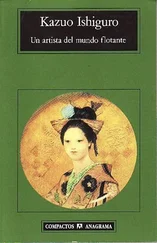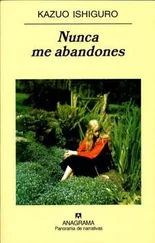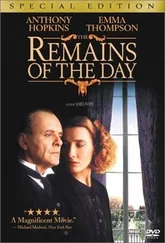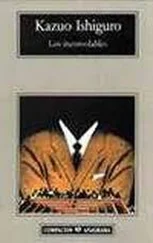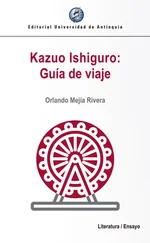“If the rumour was never true,” Tommy said, “then why did you take all our art stuff away? Didn’t the Gallery exist either?”
“The Gallery? Well, that rumour did have some truth to it. There was a gallery. And after a fashion, there still is. These days it’s here, in this house. I had to prune it down, which I regret. But there wasn’t room for all of it in here. But why did we take your work away? That’s what you’re asking, isn’t it?”
“Not just that,” I said quietly. “Why did we do all of that work in the first place? Why train us, encourage us, make us produce all of that? If we’re just going to give donations anyway, then die, why all those lessons? Why all those books and discussions?”
“Why Hailsham at all?” Madame had said this from the hallway. She came past us again and back into the darkened section of the room. “It’s a good question for you to ask.”
Miss Emily’s gaze followed her, and for a moment, remained fixed behind us. I felt like turning to see what looks were being exchanged, but it was almost like we were back at Hailsham, and we had to keep facing the front with complete attention. Then Miss Emily said:
“Yes, why Hailsham at all? Marie-Claude likes to ask that a lot these days. But not so long ago, before the Morningdale scandal, she wouldn’t have dreamt of asking a question like that. It wouldn’t have entered her head. You know that’s right, don’t look at me like that! There was only one person in those days who would ask a question like that, and that was me. Long before Morningdale, right from the very beginning, I asked that. And that made it easy for the rest of them, Marie-Claude, all the rest of them, they could all carry on without a care. All you students too. I did all the worrying and questioning for the lot of you. And as long as I was steadfast, then no doubts ever crossed your minds, any of you. But you asked your questions, dear boy. Let’s answer the simplest one, and perhaps it will answer all the rest. Why did we take your artwork? Why did we do that? You said an interesting thing earlier, Tommy. When you were discussing this with Marie-Claude. You said it was because your art would reveal what you were like. What you were like inside. That’s what you said, wasn’t it? Well, you weren’t far wrong about that. We took away your art because we thought it would reveal your souls. Or to put it more finely, we did it to prove you had souls at all.”
She paused, and Tommy and I exchanged glances for the first time in ages. Then I asked:
“Why did you have to prove a thing like that, Miss Emily? Did someone think we didn’t have souls?”
A thin smile appeared on her face. “It’s touching, Kathy, to see you so taken aback. It demonstrates, in a way, that we did our job well. As you say, why would anyone doubt you had a soul? But I have to tell you, my dear, it wasn’t something commonly held when we first set out all those years ago. And though we’ve come a long way since then, it’s still not a notion universally held, even today. You Hailsham students, even after you’ve been out in the world like this, you still don’t know the half of it. All around the country, at this very moment, there are students being reared in deplorable conditions, conditions you Hailsham students could hardly imagine. And now we’re no more, things will only get worse.”
She paused again, and for a moment she seemed to be inspecting us carefully through narrowed eyes. Finally she went on:
“Whatever else, we at least saw to it that all of you in our care, you grew up in wonderful surroundings. And we saw to it too, after you left us, you were kept away from the worst of those horrors. We were able to do that much for you at least. But this dream of yours, this dream of being able to defer . Such a thing would always have been beyond us to grant, even at the height of our influence. I’m sorry, I can see what I’m saying won’t be welcome to you. But you mustn’t be dejected. I hope you can appreciate how much we were able to secure for you. Look at you both now! You’ve had good lives, you’re educated and cultured. I’m sorry we couldn’t secure more for you than we did, but you must realise how much worse things once were. When Marie-Claude and I started out, there were no places like Hailsham in existence. We were the first, along with Glenmorgan House. Then a few years later came the Saunders Trust. Together, we became a small but very vocal movement, and we challenged the entire way the donations programme was being run. Most importantly, we demonstrated to the world that if students were reared in humane, cultivated environments, it was possible for them to grow to be as sensitive and intelligent as any ordinary human being. Before that, all clones—or students, as we preferred to call you—existed only to supply medical science. In the early days, after the war, that’s largely all you were to most people. Shadowy objects in test tubes. Wouldn’t you agree, Marie-Claude? She’s being very quiet. Usually you can’t get her to shut up on this subject. Your presence, my dears, appears to have tied her tongue. Very well. So to answer your question, Tommy. That was why we collected your art. We selected the best of it and put on special exhibitions. In the late seventies, at the height of our influence, we were organising large events all around the country. There’d be cabinet ministers, bishops, all sorts of famous people coming to attend. There were speeches, large funds pledged. ‘There, look!’ we could say. ‘Look at this art! How dare you claim these children are anything less than fully human?’ Oh yes, there was a lot of support for our movement back then, the tide was with us.”
For the next few minutes, Miss Emily went on reminiscing about different events from those days, mentioning a lot of people whose names meant nothing to us. In fact, for a moment, it was almost like we were listening to her again at one of her morning assemblies as she drifted off on tangents none of us could follow. She seemed to enjoy herself, though, and a gentle smile settled around her eyes. Then suddenly she came out of it and said in a new tone:
“But we never quite lost touch with reality, did we, Marie-Claude? Not like our colleagues at the Saunders Trust. Even during the best of times, we always knew what a difficult battle we were engaged in. And sure enough, the Morningdale business came along, then one or two other things, and before we knew it all our hard work had come undone.”
“But what I don’t understand,” I said, “is why people would want students treated so badly in the first place.”
“From your perspective today, Kathy, your bemusement is perfectly reasonable. But you must try and see it historically. After the war, in the early fifties, when the great breakthroughs in science followed one after the other so rapidly, there wasn’t time to take stock, to ask the sensible questions. Suddenly there were all these new possibilities laid before us, all these ways to cure so many previously incurable conditions. This was what the world noticed the most, wanted the most. And for a long time, people preferred to believe these organs appeared from nowhere, or at most that they grew in a kind of vacuum. Yes, there were arguments. But by the time people became concerned about… about students, by the time they came to consider just how you were reared, whether you should have been brought into existence at all, well by then it was too late. There was no way to reverse the process. How can you ask a world that has come to regard cancer as curable, how can you ask such a world to put away that cure, to go back to the dark days? There was no going back. However uncomfortable people were about your existence, their overwhelming concern was that their own children, their spouses, their parents, their friends, did not die from cancer, motor neurone disease, heart disease. So for a long time you were kept in the shadows, and people did their best not to think about you. And if they did, they tried to convince themselves you weren’t really like us. That you were less than human, so it didn’t matter. And that was how things stood until our little movement came along. But do you see what we were up against? We were virtually attempting to square the circle. Here was the world, requiring students to donate. While that remained the case, there would always be a barrier against seeing you as properly human. Well, we fought that battle for many years, and what we won for you, at least, were many improvements, though of course, you were only a select few. But then came the Morningdale scandal, then other things, and before we knew it, the climate had quite changed. No one wanted to be seen supporting us any more, and our little movement, Hailsham, Glenmorgan, the Saunders Trust, we were all of us swept away.”
Читать дальше
